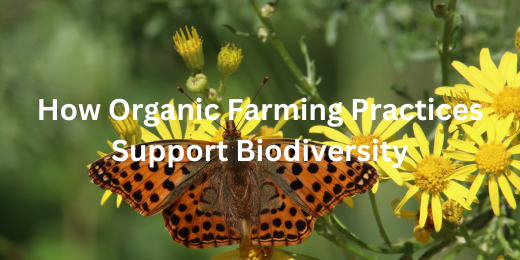
How Organic Farming Practices Support Biodiversity
Organic farming and biodiversity
The Importance of Biodiversity in South Indian Agriculture
The number of forms of life present in a specific ecosystem is known as biodiversity. It is essential to preserving the ecological equilibrium and boosting agricultural output. In South Indian agriculture, biodiversity includes pollinators, soil microbes, and various plant and animal species.
Organic farming and biodiversity are closely linked, as organic practices promote diverse ecosystems. These practices include crop rotations, the use of native plants, and the creation of wildlife habitats. The benefits of organic farming extend to preserving the health of these diverse species, ensuring sustainable agriculture.
Conventional farming practices pose significant threats to biodiversity. The heavy use of chemical pesticides and monocultures reduces the variety of species in an area. Organic farming methods, on the other hand, help mitigate these threats, supporting a richer and more resilient agricultural environment.
Organic Farming: A Boon for Biodiversity
Growing crops without the use of artificial chemicals is known as organic farming. It uses organic materials and techniques to improve soil fertility and manage pests. Sustainable agriculture and better ecosystems are encouraged by this strategy.
In South India, key principles of organic farming include crop rotation, natural pest control, and the use of organic fertilisers. By using these techniques, soil health is preserved and reliance on chemical inputs is decreased. Thus, there is a close relationship between biodiversity and organic farming that supports a wide variety of species.
These principles differ significantly from conventional farming methods. Traditional methods often rely on chemical fertilisers and pesticides, which can harm the environment. The benefits of organic farming include improved soil health, reduced pollution, and enhanced biodiversity, making it a more sustainable choice.
Organic Farming and a Thriving Ecosystem
Organic farming encourages increased populations of beneficial insects and pollinators. Bees and ladybugs thrive in these environments, aiding in plant pollination and pest control. Organic farming and biodiversity create a balanced ecosystem that supports various species.
Improved soil health is another advantage of organic farming. Diverse microbial communities flourish, enhancing soil fertility and plant growth. This is one of the significant benefits of organic farming, leading to sustainable and productive agricultural practices.
Birds and other species find refuge on organic farms. The absence of harmful chemicals creates a safer habitat for many species. These environments contribute to overall biodiversity, ensuring a thriving and resilient ecosystem.
Organic Practices: Nature’s Pest Control
In order to reduce pests, organic farming fosters natural predators including ladybugs and birds. These predators maintain the balance of ecosystems by eating harmful insects. This method promotes organic farming and biodiversity, benefiting both agriculture and the environment.
Crop rotation and neem oil are two examples of organic pest control techniques. These practices reduce pest populations without harmful chemicals. The benefits of organic farming include healthier crops and ecosystems, as well as safer food for consumers.
Reduced reliance on chemical pesticides is a significant advantage of organic farming. Chemical-free farming protects soil health and water quality. This approach ensures a sustainable future by maintaining the delicate balance of nature.
Benefits Beyond Biodiversity: A Sustainable Future
Organic farming significantly improves soil fertility and water retention. These methods improve the soil’s capacity to retain nutrients and water, which promotes healthy plant development. Organic farming and biodiversity work together to create robust, resilient agricultural systems.
Healthier crops with higher nutritional value are among the key benefits of organic farming. Organic produce is often richer in vitamins and minerals due to natural growing methods. This results in more nutritious food that supports better health for consumers.
It is imperative for the future to support regional farmers and a food system that is environmentally friendly. Organic farming empowers small farmers by reducing reliance on costly chemicals. This approach promotes economic stability and environmental sustainability for communities.
Taking Action: How You Can Support Organic Farming
Choosing organic produce whenever possible supports healthier ecosystems and communities. By opting for organic foods, consumers encourage sustainable agricultural methods. This choice directly contributes to organic farming and biodiversity, promoting a more balanced environment.
Supporting local organic farmers’ markets is another impactful action. Purchasing from these markets helps local farmers thrive and reduces the carbon footprint associated with food transport. This practice highlights the benefits of organic farming for both producers and consumers. Purchase high-quality organic products at your nearest Uyir Organic Farmers Market, or visit www.uyironline.in or www.uyirorganic.farm to buy online.
Encouraging organic practices in your own garden also makes a difference. Using natural fertilisers and pest control methods fosters a healthier garden environment. These steps support broader organic farming efforts and contribute to a sustainable future.